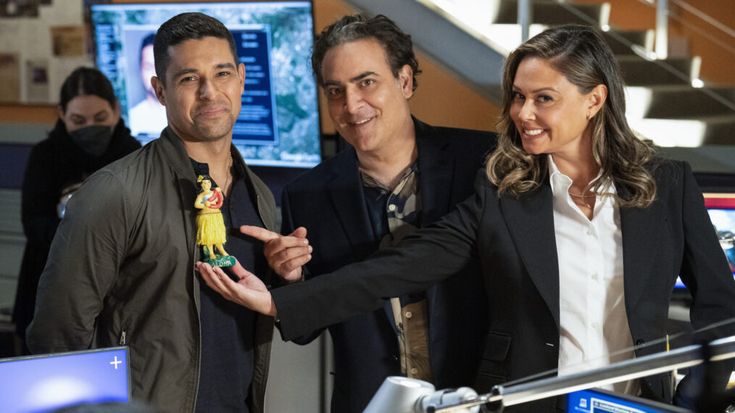
Only hearing about Jesse’s family has limited the series’ exploration of the character, which has hurt him in comparison to the others on the team. Jesse has been developed far less, mostly around for a little levity in their investigations or to throw out a line about parenting to bond with Jane. It’s sad because there’s great potential for the character, as we see a little in the episodes with his daughter Gracie. However, even in those episodes, Jesse’s relationship with Gracie doesn’t feel as fully fleshed out as it could and should have been.
For instance, we constantly see Jane with her children Alex (Kian Talan) and Julie (Mahina Napolean), which gives us the chance to get to know her outside of work as her children are the lights of her life. They test her emotionally and mentally, often putting her in tough situations where she must decide how to move forward and be the best mother she can while being fair and finding the best way to prepare them for adulthood and a world that isn’t always kind or forgiving.
In “Pirates,” Jesse is tasked with saving Gracie and others from the intruders on their boat, which is a great test for him as an agent but not necessarily as a father. Likewise, in “Nightwatch,” he’s called to work on a case during his day off when he’s supposed to be teaching Gracie about cars — though he’s not quite ready to teach her how to drive yet. The first episode with Gracie is intense and shows his love for a child, but we don’t really get much time to see their actual relationship. Even in the second episode, which should have provided a much-needed spotlight on the Boone family, this story didn’t receive much attention. When being a parent is so much of Jane’s story, it’s unforgivable that Jesse’s family isn’t receiving a similar focus in his stories and even worse that we have yet to meet three members.
Jesse Boone — The Disconnected Dad of ‘NCIS: Hawai’i’
If you’ve been following NCIS: Hawai’i, you probably know Jesse Boone as the dedicated Special Agent in Charge, always backing Jane Tennant and leading investigations with poise. But here’s the thing: while he’s all-in at work, Jesse seems to have checked out at home. For a character introduced as a loving husband and father, he’s oddly absent from his children’s lives on screen. Fans have started asking: Is Jesse Boone even really a dad on this show, or is he just playing the part in name only? Let’s break it down.
The Setup—Jesse’s Family Life Was Meant to Be Relatable
A Refreshingly Normal Family Dynamic
When NCIS: Hawai’i first aired, Jesse was portrayed as a grounded, stable figure—one of the few agents with a full-blown family life. He’s married, has kids, and lives a relatively quiet island life when he’s not chasing down criminals.
At first glance, he was a welcome break from the usual trope of emotionally unavailable law enforcement characters.
But That Family Angle Was Quickly Abandoned
Here’s the kicker: after early mentions of his wife and kids, the show did a complete 180. His home life vanished from the storyline. No scenes at the dinner table. No struggles with parenting. No father-kid bonding moments. Jesse just became… an agent.
The Shift—How Jesse Became a Background Parent
The Vanishing Act of Jesse’s Children
Remember when Jesse’s daughter was introduced in Season 1? Barely. That’s because she disappeared just as quickly as she arrived. The occasional name drop doesn’t cut it. We never get to see Jesse being an actual dad. There’s no emotional depth, no parenting dilemmas, no growth.
Work-Life Balance? What Balance?
On-screen, Jesse is always either at HQ, in the field, or talking shop. While Jane Tennant’s character juggles motherhood and her career in almost every episode, Jesse’s family life is nonexistent. The imbalance is glaring.
Why This Matters—Character Development Feels Incomplete
Fatherhood Isn’t Just a Title
Sure, Jesse might have a family off-screen, but TV is a show-don’t-tell medium. When writers neglect to show a character’s relationships, it sends a message: that part of their life isn’t important.
Fans Want Substance, Not Just Action
Let’s be real—character-driven shows like NCIS thrive when fans feel emotionally invested. And that emotional connection comes from vulnerability. Jesse’s missing family scenes make him feel one-dimensional, like a cardboard cutout of a dad.
Missed Opportunities in Storytelling
The Emotional Impact That Never Was
Imagine an episode where Jesse’s kid is involved in a cybercrime investigation. Or maybe his teenage son is struggling with identity on an island full of cultural traditions. These stories could add depth, relatability, and real stakes.
But the writers haven’t gone there—and the fans notice.
Other Characters Get It Right
Compare Jesse to Jane Tennant, who balances raising two kids with leading the team. Or Ernie, whose personal quirks and relationships are woven into the plot. Jesse, on the other hand, is stuck in work-only mode.
Is This a Case of Lazy Writing?
Or a Deliberate Choice?
It’s hard to say. Maybe the writers want Jesse to be a stoic, emotionally distant character. But if that’s the case, it clashes with how he was introduced. The inconsistency weakens his overall arc.
Background Dad Syndrome Is Real in TV
Unfortunately, this isn’t new. Plenty of shows sideline father figures—especially when the mother’s narrative is front and center. But with today’s more emotionally open audiences, that just doesn’t fly anymore.
The Audience Reaction—Noticing the Absence
Social Media Calls It Out
Scroll through Twitter or Reddit, and you’ll find threads like “Does Jesse even see his kids?” or “Why does Jesse feel like a single dude with a ring?” Viewers are talking—and they’re not wrong.
Emotional Depth Matters More Than Ever
In today’s TV landscape, character complexity is king. Fans want heroes who cry, struggle, and parent—not just shoot guns and chase bad guys. Jesse’s flatlining family narrative sticks out in a bad way.
How This Impacts the Show’s Bigger Themes
Representation of Real Island Life? Not Quite
The whole point of NCIS: Hawai’i was to portray diverse, grounded, and community-driven lives in the islands. Leaving out Jesse’s family makes his character feel like a tourist in his own storyline.
The Double Standard in Parental Roles
Why does Jane get to be both a boss and a mom on screen, but Jesse is stripped of fatherhood? It raises questions about gender balance in storytelling. Fathers deserve screen time too—especially good ones.

Can the Writers Redeem Jesse’s Role as a Dad?
Absolutely—But Time Is Running Out
There’s still a chance to course-correct. A dedicated episode showing Jesse navigating family life would work wonders. Fans are ready. They want more.
Lean Into the Relatable Dad Stories
Throw in an awkward teen-parent moment. Show him helping with homework while answering a work call. Give us that real-life struggle. Jesse could be the dad figure TV needs—if the writers just let him.
Final Thoughts—The Hollow Title of “Dad”
Jesse Boone might be a “father” on paper, but on screen? He’s practically invisible in his kids’ lives. It’s a shame, really, because the character has potential. Viewers are craving depth, emotional stakes, and grounded storytelling—and Jesse’s neglected fatherhood is a missed opportunity. It’s time NCIS: Hawai’i either commits to showing Jesse as a real, present father—or stops pretending altogether.
Conclusion
Jesse Boone started off as a breath of fresh air: a strong agent with a stable family. But that promise faded fast. His role as a father has become more of a checkbox than a character trait. If NCIS: Hawai’i wants to build layered, meaningful stories, it’s time to bring Jesse’s home life back into focus. After all, being a parent isn’t just a title—it’s a storyline worth telling.